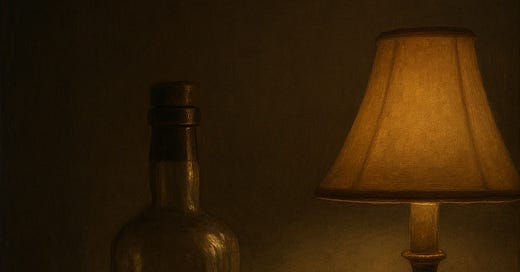On States, Selves, and the Illusion of Essence
A gentle look at mood, identity, and our shifting selves.
The morning after a couple of drinks—which isn’t a frequent occurrence mind you—I often notice something subtle but consistent. A slight lift. A better mood. A gentle uptick in sociability. I reach out to people I might normally hesitate to message. I find myself just a touch more hopeful, more willing. The world doesn’t feel radically different—just a little more accommodating, a little easier to move through.
And I’ve always noticed this. But now, I notice myself noticing it.
I don’t feel ‘better,’ exactly. Not in any deep or noble sense. But I do feel looser. I act on small impulses I might usually ignore. I initiate instead of withdraw. I feel, briefly, more like someone I’d want to be. Which leads to a question: if a slight chemical nudge can do this, what does that say about me?
More pointedly: is this version of me more me than the one without it?
If a shift in chemistry can make me more open, more engaged, more willing to connect—shouldn’t I seek that shift? Not necessarily through alcohol, but through anything that aligns me with this lighter, unencumbered self. Isn’t there a moral case to be made for being the version of yourself that engages more willingly with the world?
It’s easy to dismiss this as self-indulgence. But the question lingers. If something brings out your warmth or your curiosity, your reach toward others—shouldn’t you try to live in that space more often? Isn’t it, in a way, your duty—to yourself, and to those around you?
But that’s where things begin to blur. Because as I follow the thread, I run into something harder to hold: what if there is no essential self at all? What if we’re not trying to enhance or liberate a core self, but to stabilize something that was never fixed to begin with?
The ‘alcohol me’ is not a fiction. But neither is the tentative, reserved version of me. Neither can claim full ownership. I’m not one or the other—I’m the continuous movement between them. And maybe a little more too. The chemical doesn’t invent a new self; it disinhibits something already present. But even that feels like a shallow conclusion. It still leans on the idea that there’s a ‘real’ me underneath it all, waiting to be excavated.
And what if that’s the trap?
What if the whole idea of the ‘essential self’ is an illusion—a romantic one, but still a trap? A self we try to be loyal to, even as it keeps shifting. A self we keep defending, even when it’s no longer helping us. Maybe identity isn’t something we discover or preserve. Maybe it’s something we perform—selectively, and sometimes painfully. Maybe it’s how we judge others, because there’s no way inside them.
‘Alcohol me is more me,’ we might say. But maybe neither is more. Maybe both are just states—temporary arrangements of mood, habit, energy, and context. A passing weather.
And so the question dissolves. Not because it’s been answered, but because it can’t be answered. Or doesn’t need to be.
If I wake up one day feeling paranoid, closed off, unreachable—maybe that’s not a flaw to fix or a signal to escape. Maybe it’s just a state. Something to sit with. To let pass through. Not something that needs to mean anything about me.
The need to enhance ourselves, or return to some ‘truer’ version, begins to look a lot like resistance to simply being. And being isn’t always smooth, or social, or brave. Sometimes it’s hesitant also. Slow too. Even afraid.
But maybe that’s okay too. Maybe the point isn’t to feel better. Or even to be better. Maybe it’s just to be—with whatever version is currently available.
And when it feels right, act. Not because it’s more you or less you. But simply because you should and you can.




